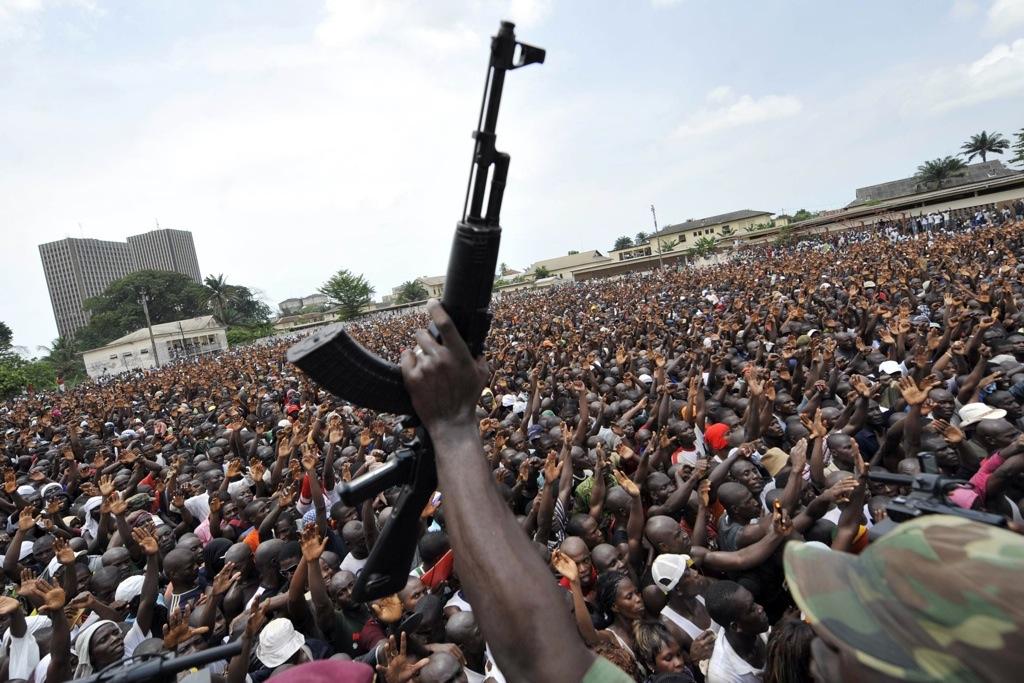Civil war looms in Ivory Coast
A soldier in the Ivory Coast Army brandishes his gun in front of thousands of young supporters of Ivorian strongman Laurent Gbagbo. The young men gathered to enroll in the Ivorian army, on March 21, 2011 in Abidjan. Fervent backers of Gbagbo streamed to enlist in his armed forces as the United Nations faced pressure to do more to protect civilians in post-election bloodshed in which more than 400 people have been killed. Gbagbo, who refuses to cede power after disputed November polls, is seeking to boost his army and quash efforts by fighters backing internationally recognized president Alassane Ouattara to seize the economic capital Abidjdan.
Ivory Coast is moving closer to a return to civil war as men are joining rival armed forces in Abidjan.
Thousands of young men gathered at an army base in Abidjan to sign up to fight for Laurent Gbagbo, the president who lost the November election but refuses to give up power, according to the BBC.
At the same time other young men say they are forming a new army in support of Alassane Ouattara, the internationally recognized winner of the election, who claims to be Ivory Coast's rightful president. Ouattara's supporters say they are forming a new army made up of former rebels and army dissenters.
The enlistments of men into two rival armed forces brings Ivory Coast to the verge of civil war. Ivory Coast was in civil war from 2002 until 2005, when a peace accord was signed. The November election was supposed to have marked the country's return to a stable democracy. But by refusing to accept defeat, Gbagbo is dividing the country.
Already there have been a number of armed clashes between the Gbagbo and Ouattara sides, in which an estimated 435 people have been killed. Last week at least 30 people were killed in a mortar attack on a market in Abobo, a pro-Ouattara suburb of Abidjan.
"It is quite difficult to avoid the conclusion that this may be an internaitonal crime, possibly a crime against humanity," said Rupert Colville, spokesman for the UN High Commission for Human Rights in Geneva, of the rocket attack. The U.N. has been urged to investigate the incident by the French and British governments. Gbagbo's government denies ordering the violence.
The country is dividing between the North, generally in support of Oattara, and the South, largely loyal to Gbagbo. Ouattara's force claims to have chased Gbagbo's army out of several towns.
More than 500,000 people have fled their homes, fearing a return to civil war. Nearly 100,000 of those people have gone to neighboring Liberia, according to the United Nations.
The West African countries surrounding Ivory Coast support Ouattara and have urged Gbagbo to leave office and his charge over the army. The African Union has given Gbagbo until March 24 to hand over power. But the enlistment of new members into the army indicates Gbagbo has no intention of stepping down.
Likewise Ouattara's creation of a new force signals that he is prepared to fight. It is estimated Ouattara's new force will draw 8,000 to 10,000 men, many from the rebels who fought in the civil war.
In addition there are 9,000 United Nations peacekeepers in Ivory Coast. The UN force has protected Ouattara from attacks by Gbagbo's army. Ouattara has offices in the Golf Hotel in Abidjan, Ivory Coast's largest city, and part of the UN force is protect the hotel from attack.
Ivory Coast, the world's largest cocoa producer, used to be the most prosperous country in West Africa.
Gbagbo is also being pressed by international economic sanctions on exports of cocoa and have banned payments going into government accounts that Gbagbo can access.
Every day, reporters and producers at The World are hard at work bringing you human-centered news from across the globe. But we can’t do it without you. We need your support to ensure we can continue this work for another year.
Make a gift today, and you’ll help us unlock a matching gift of $67,000!
